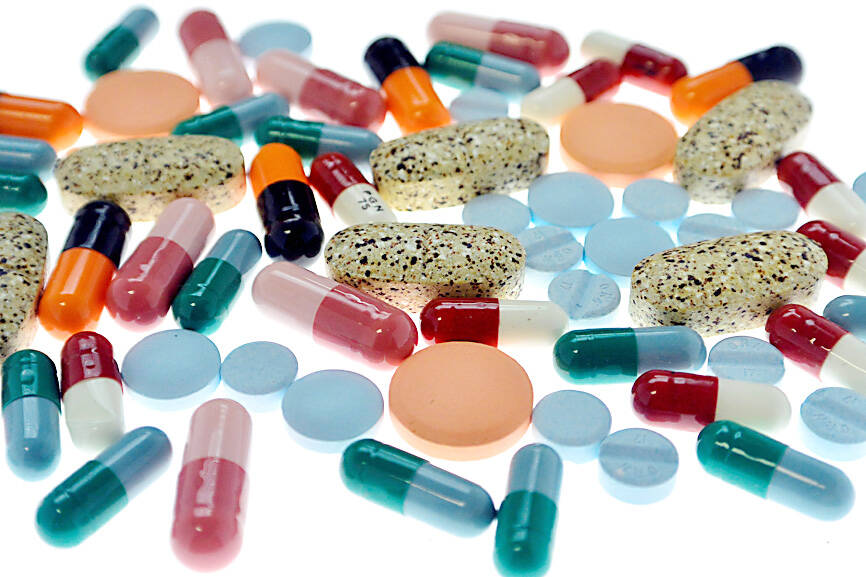Lotus Pharmaceutical Co (美時化學製藥) has received approval from Japan’s Pharmaceuticals and Medical Devices Agency for its generic version of blood cancer drug Revlimid (lenalidomide), boosting its shares by as much as 3.54 percent in early Taipei trading yesterday.
The approval was for 2.5mg and 5mg capsules of lenalidomide, which it jointly developed with Japan’s Fuji Pharma Corp, Lotus Pharmaceutical said in a regulatory filing on Tuesday.
Lotus Pharmaceutical was responsible for developing the lenalidomide formula — the company’s first high-value generic product in Japan, while Fuji Pharma ran local bioequivalence studies of the drug.

Photo: Reuters
With the approval, Lotus Pharmaceutical is to supply the finished product to Fuji Pharma for commercialization in Japan. The companies expect to launch the product in Japan this year.
Sales of Revlimid in Japan totaled about US$282 million last year, Lotus Pharmaceutical said, citing data from life sciences researcher Iqvia Institute.
As of the second quarter, only Osaka, Japan-based Sawai Pharmaceutical Co had obtained agency approval for lenalidomide, but its generic product has not yet been marketed in the Japanese market, Lotus Pharmaceutical said.
“Lotus and Fuji are among the first to market their product in Japan and gain a good market share there,” Capital Investment Management Corp (群益投顧) said in a note yesterday. “Lotus received 16 approvals for its generic products worldwide in the second quarter, which is a remarkable achievement and will gradually contribute to its revenue and royalty income in the future.”
Lotus Pharmaceutical shares surged in early morning trading yesterday before retreating to close up 1.71 percent at NT$268.
Capital Investment gave Lotus Pharmaceutical a “buy” rating with a 12-month target price of NT$295.
Lotus Pharma’s net profit more than tripled to NT$1.27 billion (US$39.82 million) in the second quarter, up 286 percent from NT$327.67 million in the same period last year, the company said on Tuesday.
That translated into earnings per share (EPS) of NT$4.85, the best second-quarter performance in its history.
In the first half of the year, EPS totaled NT$9.43, up 217 percent year-on-year, it said.
Lotus Pharma’s cumulative revenue in the first seven months totaled NT$11.25 billion, up 58.16 percent from the same period last year, company data showed.
With better business prospects, the company projected annual revenue growth of 13 to 15 percent for this year, higher than its previous estimate of 7 to 10 percent, while gross margin is expected to reach 55 percent, compared with 50 percent in its earlier forecast.

UNCERTAINTY: Innolux activated a stringent supply chain management mechanism, as it did during the COVID-19 pandemic, to ensure optimal inventory levels for customers Flat-panel display makers AUO Corp (友達) and Innolux Corp (群創) yesterday said that about 12 to 20 percent of their display business is at risk of potential US tariffs and that they would relocate production or shipment destinations to mitigate the levies’ effects. US tariffs would have a direct impact of US$200 million on AUO’s revenue, company chairman Paul Peng (彭雙浪) told reporters on the sidelines of the Touch Taiwan trade show in Taipei yesterday. That would make up about 12 percent of the company’s overall revenue. To cope with the tariff uncertainty, AUO plans to allocate its production to manufacturing facilities in

Taiwan will prioritize the development of silicon photonics by taking advantage of its strength in the semiconductor industry to build another shield to protect the local economy, National Development Council (NDC) Minister Paul Liu (劉鏡清) said yesterday. Speaking at a meeting of the legislature’s Economics Committee, Liu said Taiwan already has the artificial intelligence (AI) industry as a shield, after the semiconductor industry, to safeguard the country, and is looking at new unique fields to build more economic shields. While Taiwan will further strengthen its existing shields, over the longer term, the country is determined to focus on such potential segments as

TAKING STOCK: A Taiwanese cookware firm in Vietnam urged customers to assess inventory or place orders early so shipments can reach the US while tariffs are paused Taiwanese businesses in Vietnam are exploring alternatives after the White House imposed a 46 percent import duty on Vietnamese goods, following US President Donald Trump’s announcement of “reciprocal” tariffs on the US’ trading partners. Lo Shih-liang (羅世良), chairman of Brico Industry Co (裕茂工業), a Taiwanese company that manufactures cast iron cookware and stove components in Vietnam, said that more than 40 percent of his business was tied to the US market, describing the constant US policy shifts as an emotional roller coaster. “I work during the day and stay up all night watching the news. I’ve been following US news until 3am

COLLABORATION: Given Taiwan’s key position in global supply chains, the US firm is discussing strategies with local partners and clients to deal with global uncertainties Advanced Micro Devices Inc (AMD) yesterday said it is meeting with local ecosystem partners, including Taiwan Semiconductor Manufacturing Co (TSMC, 台積電), to discuss strategies, including long-term manufacturing, to navigate uncertainties such as US tariffs, as Taiwan occupies an important position in global supply chains. AMD chief executive officer Lisa Su (蘇姿丰) told reporters that Taiwan is an important part of the chip designer’s ecosystem and she is discussing with partners and customers in Taiwan to forge strong collaborations on different areas during this critical period. AMD has just become the first artificial-intelligence (AI) server chip customer of TSMC to utilize its advanced